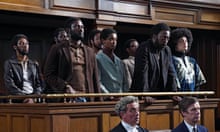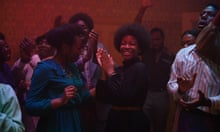“I’m used to always doing dramatic work,” says 31-year-old Malachi Kirby. “There is something about my face that people must enjoy seeing crying.” The London-born actor has made a name for himself in recent years playing a series of gut-wrenching, emotional heavyweights; first as Kunta Kinte in the 2016 remake of the wildly popular 1977 series Roots and then as real-life activist Darcus Howe in Mangrove, the opening episode of Steve McQueen’s Small Axe series last year. Kirby seemed to empty all of himself into each character – from the rebellious slave Kinte to the fiercely hopeful Trinidadian orator Howe – not leaving a trace of his identity behind.
It is surprising, then, to encounter the real Kirby over video call: boyish, bearded and softly spoken. It is a side of himself he has worked hard at bringing out into the public over the years. “I was a very shy and introverted kid,” he says. “Acting was something that presented itself to me almost through a series of random occurrences and it showed me that I could communicate how I felt without saying it explicitly, since I could speak through the characters I was playing.”
Kirby’s first call to acting was through a course at south London’s Battersea Arts Centre, which his mother encouraged him to attend after remembering that his father, who died when he was six, had noticed a dramatic aptitude in his boy. Kirby describes the centre as “a lifesaver”, a place where he was encouraged to mix with people from different backgrounds and expand his way of thinking. “Everyone would clap even if you had performed badly, so it encouraged you to open up,” he says. “It put me on a totally different path; without it, I didn’t know acting was something that was possible for someone like me.”
Kirby’s first roles were walk-on parts, often “gang leader”, in British TV staples such as Casualty, Silent Witness and Doctors. Although he says he didn’t feel typecast, it took a particular encounter with a casting director to widen his range. “I used to go into auditions in character because I didn’t have the confidence to go in as myself,” he says. “I was trying for a role with a casting director I had seen a few times before, but this time she asked me questions that led me back to myself. She was surprised that I wasn’t like the gang-type role I was going for at all. She then made me read for a different part, which I got, and that’s when I realised that I could do something other than play the hard guy.”

It wasn’t until he was cast as Kunta Kinte – a role etched into public consciousness ever since Alex Haley’s bestselling saga was televised, and then used as a cultural touchstone by everyone from Kendrick Lamar to the cartoon Family Guy – that Kirby found himself a breakout star. Despite an “awful” first audition where he arrived late and fumbled his lines, he found himself connecting with the character’s turmoil during a call-back. “I had an out-of-body experience that day,” he says. “Somewhere during the reading, I started improvising as the words on the page didn’t feel like they were enough. I was seeing my own emotion in him.”
He describes the ensuing gruelling five-month shoot as both “beautiful and terrible”. “Terrible because of having to get as close to putting myself in those shoes as I could. Beautiful because I worked with some incredible people and I was accessing a history that is so important,” he says.
The show went on to receive critical acclaim, with the Guardian describing Kirby’s efforts as a “stunning breakout performance”. Finding social media largely “overwhelming” due to its intense scrutiny and pressures to be outspoken, Kirby distanced himself from the responses to the show. “I went into hiding after it came out,” he says. “I was pretty anxious about the attention.”
It is a tactic he has kept up to this day, only operating an Instagram account and even then not having the app on his phone. Some things cut through the noise of social media, though, such as the killing of George Floyd in May 2020, which sparked a long summer of global Black Lives Matter protests. In the UK, we experienced an overdue reckoning with the whitewashing of our history and as if by perfect predetermination, director Steve McQueen’s Small Axe series landed on our screens in November 2020, aiming to tell the lesser-known stories of Britain’s West Indian community from the 1960s to the 1980s.
The opening instalment, Mangrove, tells the story of the Mangrove Nine, a group tried at the Old Bailey in 1970 for protesting about repeated police raids of the Mangrove Caribbean restaurant in Notting Hill. Kirby plays Howe, who eloquently represented himself in court and who would go on to become an activist and fixture on TV debates about race in the decades to come.
It was a story Kirby had not heard about before his audition. “When I learned about this protest, it felt like a history had been stolen from me,” he says. “Part of my culture had been hidden – these people were fighting for me and I had no idea they existed.” Working with McQueen proved to be a similar revelation and Kirby enthuses about the experience. “There’s something terrifying about working with him because he knows exactly what he’s doing; he’s so passionate and there is no room for mediocrity – you have to bring it all to the table,” he says. “But he also created such a comfortable and welcoming environment on set, one where you could be vulnerable and feel like you were in control – it made performing someone like Darcus, who is so outspoken, much easier.”
Again, Kirby largely stayed away from the online responses to the show – uniformly ecstatic in their praise – choosing to enjoy the episodes with his family instead. “We went around to my nan’s house each Sunday and it was beautiful to see her and my mum watching their lives reimagined on the screen. Finally, they could see themselves.”

In terms of the timing of its release, Kirby describes the show as feeling “prophetic”. “It was surreal,” he says. “Here’s this story from 1970 still playing out today. While there has been progress, not enough has been done. George Floyd certainly wasn’t the first and he sadly won’t be the last. But it was a blessing to be able to respond to that moment with art and to hopefully educate others to effect change.”
After these weighty historical roles, Kirby’s latest feels like a marked change of pace. Devils, set in the world of international finance in the wake of the 2008 recession, sees Kirby play Oliver Harris, a gifted student-turned-hacker who becomes embroiled in the besuited thrills of corporate intrigue.
“Oliver is one of the most enjoyable characters I’ve ever played,” he says. “He grows up on a council estate in south London and could easily be a stereotype, but he’s a geek. He’s not separate from the environment that he comes from, but he’s not a product of it either and I love that.” Finally, it seems Kirby might have his chance to play a character whose performance does not end in tears.
As for the year to come, Kirby has plenty to keep him occupied through the lockdown. There is a play he has written for the Bush theatre that was scheduled to begin rehearsals in 2020, which has now been postponed, and he is also writing a screenplay and a TV series. The subject matter is closely guarded but Kirby says it is all informed by personal experiences. “Things have come full circle, since I loved writing as a kid, so I’m very excited to be going back to that,” he says. “This past year has shown us all that you don’t know what the future holds, so I’m really trying to just enjoy the present moment and lean into telling more stories that are personal to me, to let myself come forward now.”
Devils is on Sky Atlantic and Now TV from 17 February








